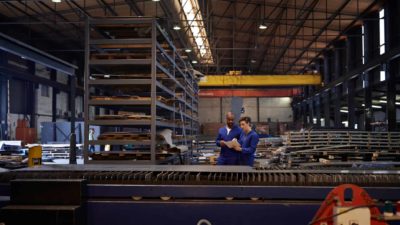When it comes to analysing ASX shares, there are countless fundamental factors and characteristics to look at.
Last week, I zeroed in on management, profiling some ASX 200 shares with founders steering the ship and others with enormous insider ownership.
Today, it's all about gross profit margins.
Put simply, gross profit is the money that a company has left after paying for the stuff it sold.
These selling costs are typically listed as 'cost of sales' or 'cost of goods sold'. You'd find this towards the top of a company's income statement.
But in some cases, companies bypass this line item altogether and don't break out cost of sales from the rest of their operating expenses.
The gross profit margin simply represents gross profit as a proportion of revenue. The higher, the better, because it means the company is holding onto a greater portion of every sales dollar.
With that in mind, let's take a look at five ASX 200 shares with deliciously-high gross margins.
Pro Medicus Limited (ASX: PME)
Topping this list is ASX 200 healthcare share Pro Medicus, a global leader in radiology imaging software.
In FY22, Pro Medicus generated $93.5 million in revenue against cost of sales of just $465,000. This translates to a staggeringly-high gross margin of 99.5%.
Crucially, Pro Medicus is a software-only business, so there are minimal costs involved in rolling out new contracts. The outcome is an incredibly capital-light, scalable business.
But while there are varying interpretations of what goes into cost of sales from company to company, Pro Medicus backs this up with extremely wide profit margins.
In fact, Pro Medicus turns two-thirds of every sales dollar into profit before tax. These margins have only been heading higher over time, demonstrating tremendous operating leverage.
Carsales.com Ltd (ASX: CAR)
Next up is the ASX 200 tech share behind Australia's leading automotive classifieds business.
In FY22, Carsales incurred cost of sales of $50 million on the way to generating revenue of $509 million. This spins up a stunning gross margin of 90%.
Carsales operates an extensive network of classifieds websites, covering everything from motorbikes and boats to caravans, trucks, construction equipment, and tyres.
In a similar vein to REA Group Limited (ASX: REA), it also lays claim to a range of different automotive classified portals around the world through a mix of full and partial ownership stakes.
Importantly, Carsales' juicy gross margin isn't lost further down the income statement. It boasts an earnings margin of 53%, achieving earnings before interest, tax, depreciation, and amortisation (EBITDA) of $270 million in FY22.
Xero Limited (ASX: XRO)
I'm sure it's no surprise to see Xero on this list, a software-as-a-service (SaaS) business leading the shift to cloud accounting.
As a Kiwi company, Xero handed in its first-half FY23 results last month. Across this period, the ASX 200 tech share drummed up revenue of NZ$658.5 million while cost of revenue came in at NZ$85.6 million.
So, all up, Xero held its gross margin steady over the prior year at an impressive 87%.
Unlike Pro Medicus and Carsales, Xero makes it easy for investors by specifying what goes into cost of revenue.
As detailed in its interim report, Xero's cost of revenue comprises expenses directly associated with hosting its services, sourcing relevant data from financial institutions, and providing support to subscribers.
Breaking this down even further, the company noted that this includes hosting costs, bank feed costs, employee-related expenses directly associated with cloud infrastructure and subscriber support, and related depreciation and amortisation.
Despite its strong gross margins, Xero continues to operate at a loss. This is because the ASX 200 tech share is prioritising future growth, ploughing droves of money into product development and marketing efforts at attractive rates of return.
WiseTech Global Ltd (ASX: WTC)
Continuing the tech theme, WiseTech is another ASX 200 share with terrific margins.
In FY22, WiseTech posted revenue of $632.2 million against cost of revenues of $92.5 million. This spits out an eye-catching gross margin of 85%, up from 83% in the prior year.
The ASX 200 tech share attributed this margin expansion to the impact of revenue growth and continuing efficiencies from its cost reduction initiatives.
WiseTech notes that its cost of revenues consists of expenses directly associated with hosting its services and providing support to customers.
Similarly to Xero, this includes data centre costs, employee-related expenses directly associated with cloud infrastructure and customer support, contracted third-party costs, and related depreciation and amortisation.
WiseTech is another ASX 200 share boasting a strong duo of gross margins and earnings margins. In FY22, the logistics software provider delivered an EBITDA margin of 50%.
Lovisa Holdings Ltd (ASX: LOV)
The common thread from the four ASX 200 shares I've profiled so far is that they're all software-only businesses.
So while its gross margin isn't quite as high as the others on this list, I wanted to give a nod to an ASX 200 share with enviable margins for a retailer.
Retailing is traditionally known as a low-margin business. But as I've covered previously, Lovisa flips the script with its vertically-integrated business model and low-cost products.
Surveying the ASX retail landscape, Accent Group Ltd (ASX: AX1) has gross margins of 55%, Temple & Webster Group Ltd (ASX: TPW) has gross margins of 45%, and JB Hi-Fi Limited (ASX: JBH) has gross margins of 23%, to pick out just a few.
But one of the things that set Lovisa apart is that all of the products it sells are designed and manufactured in-house. In contrast, many ASX retailers sell a mix of own-brand and third-party products.
This boosts Lovisa's gross margins, which came in at a whopping 79% in FY22. Put another way, for every pair of $10 earrings flying off the shelves, it paid suppliers on average just $2.10.
The ASX 200 retailer's small-store footprint also bodes well for earnings margins, with Lovisa achieving an EBITDA margin of 31% in FY22.









